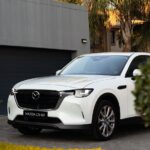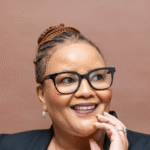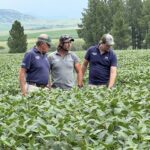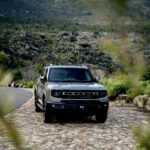By Aurelia Mbokazi-Kashe
When Hyundai first entered South Africa, few could have predicted its rise from
scepticism to one of the country’s most trusted automotive brands. Stanley Anderson, CEO of Hyundai SA, has been part of that journey from the start, shaping its growth and innovation. He sat down with Xploreza to discuss evolution, competition, and the road ahead. Here’s what he had to say in his own words.

The Humble Beginnings
Motus got the distribution rights in April 2000, and I joined in January 2001. The first
dealerships opened in June 2000. There was no appetite from franchises, so we had no choice but to open our own, which was a blessing in disguise. We own 43 dealers, and 95% of them are standalone Hyundai dealerships, controlling between 65% and 77% of our volume. The challenge for new brands is that they are multi-franchised. When you have three or four brands, you sell whatever is easier to sell. The Chinese brands are fighting each other on price, everyone wants to come in
cheaper, and they end up cannibalising each other.

The Evolution of Hyundai South Africa
In 2003 we launched the Getz. We called it the Messiah because we knew it would save us. It was the first turning point for the brand. I still see some of them on the road every day, some are 20 years old and still going.

The second one was the Tucson. Our sales went from 1 800 to 6 000, then to 16 000 and to 30 000. Fast forward, we launched other models, the Atos – an entry-level car we launched around 2008 –2009, the i20 and the i10. Then in 2010, we launched the ix35 to replace the Tucson.
We launched the H1 in 2010, just before the World Cup, our first people carrier that became very popular with families, businesses and rental companies. Prior to 2010, if somebody asked what car you drive, they would say a Getz, never a Hyundai. The product sort of built its own brand. That changed during the World Cup. We were partners in the World Cup, we had fan parks and people realised this is a global brand. That was very good for us and it turned things around for the brand.

Product Philosophy and After-Sales Focus
This industry is all about product. If you have the right product, right price, and the right time, you’re on the right path. But one thing is selling the product; the next step is looking after the customer once they’ve bought it. We’ve always had a massive focus on after-sales support and ensuring parts availability.

Our product philosophy from day one has always been: whatever specifications are in the car are included in the retail price. When we launched the Getz at R99 900, it had a radio and all the features ,and there were no surprises for the customer when they got to the showroom floor. Till today, that’s the philosophy we follow, and that’s why we’re still seen as value for money. We are also known for credibility, reliability, and durability.
Competing with Chinese Brands
Our focus isn’t just on the upfront retail price, it’s about understanding the long-term value of your vehicle over three or four years, especially in light of the ongoing price wars driven by Chinese brands. We look at the complete picture: retail price, fuel efficiency, and parts availability. After all, you don’t want to be in an accident and then wait months for replacement parts, which is unfortunately a common issue with many of the newer brands.
That’s where Hyundai stands apart. We manage this process very tightly, with three dedicated hubs across the country supplying body repairers. As a result, Hyundai vehicles involved in accidents are typically repaired within 30 days, while some of the newer brands are still struggling, with customers waiting up to five to eight months for parts. This commitment has been central to our philosophy from the start, and it’s a key reason we’ve earned lasting credibility in the market.

Business Focus Area
Another massive focus area for us as a business is corporate customers, especially leasing companies. They are still wary of the new entrants because the real cost of ownership has not yet been established, especially when it comes to fleet, parts backup, after-sales service, fuel consumption, and running costs.
We are focusing a lot there because that’s where we can maintain or grow our market share. Leasing companies cannot put a residual value against the new brands with no track record or history. They’re not sure what those vehicles will be worth in a few years’ time. That’s where we still hold our own and aim to increase sales and market share.
Business Approach and Product Success
Our approach is that we are always offensive and looking out for new ways of doing things. We work closely with our Dubai office, because that’s where we report into directly. They understand the competitors in the market, and South Africa is a very important market for them. In Africa, we’re the biggest market, obviously, and our volumes are important to them.
We’ve sold just under 800 000 cars in my 25 years. The easiest thing to do is to retain your current customers, and you can only do that through after-sales service that’s better than your competitors. For me, that’s a massive focus going forward.

One of our success stories is our little Grand i10 Cargo. We get them now without the rear seats from India, and they fill the spot of the half-tonner. These are all over the road for us, and we’ve gained a lot of traction with them. They’re taken up by tracker companies, usually the technician driving around doing fitments alone with a toolbox, or by security patrol companies. They can also claim VAT back as a commercial vehicle.
Transitioning to New Energy Vehicles
We’ve got EVs available, but it’s not viable to launch since EV sales are down year on year and account for less than 1% of the market. I don’t think the market will change in the near future, so hybrids are a good middle ground. We launched our first hybrid with the Santa Fe, but diesel is still the preferred choice.
We’re still an ICE market and will be for a very long time. Diesel averages about 110 sales a month, while the hybrid averages five. In markets like India and Indonesia –where we also have plants –it’s no different, and they’re right-hand-drive markets just like ours. So we know there will be right-hand-drive ICE vehicles for our market for many years to come.
Leadership and Management Style
I’ve learned a lot from the Koreans, that you have to listen to your people. You have to understand everyone’s point of view, give them a chance to give their input, and then make a collaborative decision. Sometimes you have to overrule them, but you do so with the correct information.

Social Responsibility and Education
When it comes to social responsibility, education is our focus area. We are opening our 23rd library on the 5th of November, which we’ve donated to schools. Reading is a massive part of education. I love to read, I’ve been reading since primary school, Secret Seven and Famous Five, Enid Blyton’s books, and that’s why I can spell today.

Stanley’s Ideal Holiday
I’m not a touristy person at all, don’t take me to a temple or a museum or to the bush for a game drive. My ideal holiday is an island holiday. For seven days, I want to see the sea and just relax, read a book, have a beer or two. Zanzibar is one of my favourite destinations, and offers good value for money. I like the all-inclusive packages, so Club Med is on my list. I’m actually going to Club Med in Durban. The pricing is similar to Mauritius or Zanzibar, but you cut the four-hour flight and the time difference.

First car:
A Blue Nissan Pulsar that had a whiny gearbox.




